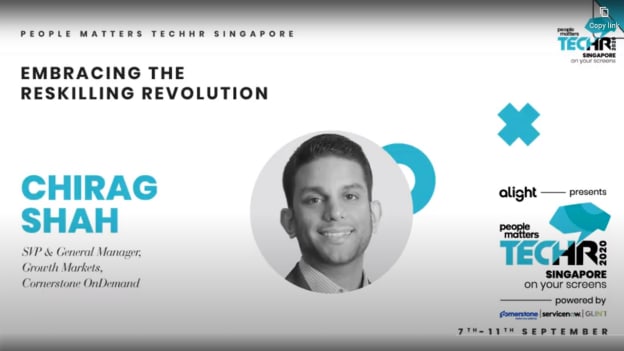Skilling: closing the gap between employer and employee priorities

The world is in a "global skills crisis", with organizations concerned that they do not have, cannot find, or are unable to develop the skills they need. But global research from Cornerstone OnDemand has found that major gaps still exist between employee and business leader perspectives, creating obstacles that are holding organizations and individuals alike.
"We all think that skills development is on track, but the reality is that for most organizations there is a disconnect between the skills that employees need to perform optimally on the job and the skills that they actually have, even before the COVID-19 pandemic, said Chirag Shah, SVP & General Manager, Growth Markets, Cornerstone OnDemand. Speaking at TechHR 2020 and presenting key findings from CSOD's global research on the importance of skills during the pandemic crisis, he explained the disconnect and offered some suggestions on how employers can bridge that gap.
Disconnect #1: the organization's ability to develop skills
In its report, "Embracing the Reskilling Revolution", CSOD found that while employees generally feel that their organizations responded effectively to COVID-19 and that they have received adequate support, business leaders across the board were far more optimistic, perceiving that they were doing better than what employees thought.
This perceptual difference extends, it turns out, to skills development. Employers are more than three times as likely to feel strongly confident in their ability to develop employees' skills, compared to the employees themselves. And they are more than twice as likely to feel that their organization is well equipped to carry out that skill development. "Clearly, there is a big difference in employer sentiment and employee sentiment when it comes to skills development," Shah observed.
Today, the top challenge that employees face in developing skills is lack of time. With 61 percent of employees pointing to it, this obstacle outstrips the lack of money (42 percent), lack of direction (39 percent) and lack of content (38 percent) by far. "It's really critical for employers to encourage their employees to develop by giving them time, money, direction, and access to content," Shah said.
Disconnect #2: the type of skills that are valued
CSOD's research shows clearly that employers prioritize hard skills over soft skills, and what's more, they prefer skills that are directly, tangibly relevant to the job: the top two priorities that surfaced for employers are technology that enables and scales skills, and technical training, especially in STEM areas.
Employees, however, want to acquire both soft and hard skills. While technology was still their top priority, it was just one of only two hard skills that they said they would prioritize to support their careers, the other being data analysis skills. Instead, they wanted to pursue leadership skills, communication skills, skills for improving mental and emotional health, skills for better time management and working in teams, and even foreign language skills.
"They want the hard skills that are relevant to the job, but they also want the soft skills, because they know that to continue growing in the organization they work with, or in their careers more generally, they need those soft skills," Shah said. The disconnect, in other words, is between a focus on the current job, and a broader view of the long-term career.
Bridging the major gaps
On the bright side, the research also shows that employers really are placing more priority on developing employees' skills. The percentage of employers who have, at a minimum, moderately prioritized skill development is 20 percent higher over the last year than it was over the last five years—indicating that the push to develop skills has accelerated considerably. So, what else can organizations do to really tackle the skilling challenges?
Firstly, they can provide plenty of resources for employees. This might include giving employees learning time or funding their skilling, providing career resources, or training managers to provide coaching and guidance—the research findings show that the majority of employees feel their managers should be the ones to tell them what new skills to develop. On top of that, they will need to find a way of measuring and tracking the outcomes, to understanding whether they are providing the right resources.
Secondly, they can invest in hyper-personalization. providing learning technology at scale to better match the available resources—whether time or content—to employees' individual needs. "One of the biggest challenges employees have today is getting access to content," Shah observed. "Finding a way for your organization to provide that for employees is absolutely critical to driving the success of the skills development program."
And thirdly, they can focus on business enablement—using agile models to support a lasting business impact. The skills development conversation, said Shah, is likely to continue for years, and businesses need to remain adaptable to continue supporting their employees through the changes to come.
At the end of the day, organizations need to actively choose to invest in and elevate their people, and help them thrive in their daily experiences. Shah said: "We're living in a period of radical change in work and the workplace, and employees rightfully feel very concerned about these changes and their place in the workforce. At the same time, however, organizations can embrace a positive outlook by taking advantage of the visionary opportunities presented by these changes."
















